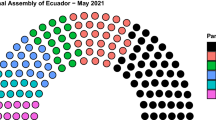Abstract
When the number of players is small in a weighted majority voting game, it can occur that one of the players has no influence on the result of the vote, in spite of a strictly positive weight. Such a player is called a “dummy” player in game theory. The purpose of this paper is to investigate the conditions that give rise to such a phenomenon and to compute its likelihood. It is shown that the probability of having a dummy player is surprisingly high and some paradoxical results are observed.
Similar content being viewed by others
References
Banzhaf JF (1965) Weighted voting doesn’t work: a mathematical analysis. Rutgers Law Rev 19: 317–343
Barvinok A (2008) Integer points in polyhedra, Zürich lectures in advanced mathematics. European Mathematical Society (EMS), Zürich
Blancard S, Lepelley D (2010) Note sur le pouvoir de vote des communes au sein des EPCI de La Réunion (unpublished manuscript)
Ehrhart E (1977) Polynômes arithmétiques et méthode des polyčdres en combinatoire, International series of numerical mathematics, vol 35. Birkhäuser Verlag, Basel
Gehrlein WV (2002) Obtaining representations for probabilities of voting outcomes with effectively unlimited precision integer arithmetic. Soc Choice Welf 19: 503–512
Leech D (2002) Power indices as an aid to institutional design: the generalized apportionment problem, Warwick Economic Research Papers, no. 648
Lepelley D, Louichi A, Smaoui H (2008) On Ehrhart polynomials and probability calculations in voting theory. Soc Choice Welf 30: 363–383
Nijenhuis A and Wilf H (1978) Combinatorial algorithms for computers and calculators, 2nd edn. Academic Press, New York. http://www.math.upenn.edu/~wilf/website/CombinatorialAlgorithms.pdf
Penrose LS (1952) On the objective study of crowd behavior. H.K. Lewis and Co, London
Straffin PD (1994) Power and stability in politics, Chapt 32. In: Aumabb RJ, Hart S (eds) Handbook of game theory, vol 2. Elsevier, Amsterdam
Wilson MC, Pritchard G (2007) Probability calculations under the IAC hypothesis. Math Soc Sci 54: 244–256
Author information
Authors and Affiliations
Corresponding author
Rights and permissions
About this article
Cite this article
Barthélémy, F., Lepelley, D. & Martin, M. On the likelihood of dummy players in weighted majority games. Soc Choice Welf 41, 263–279 (2013). https://doi.org/10.1007/s00355-012-0683-1
Received:
Accepted:
Published:
Issue Date:
DOI: https://doi.org/10.1007/s00355-012-0683-1




